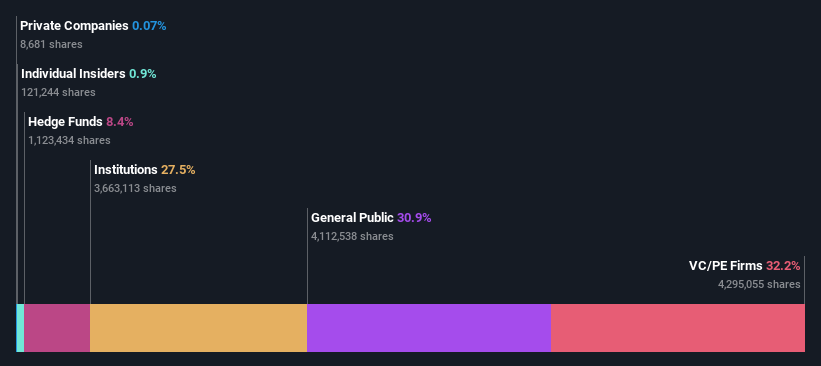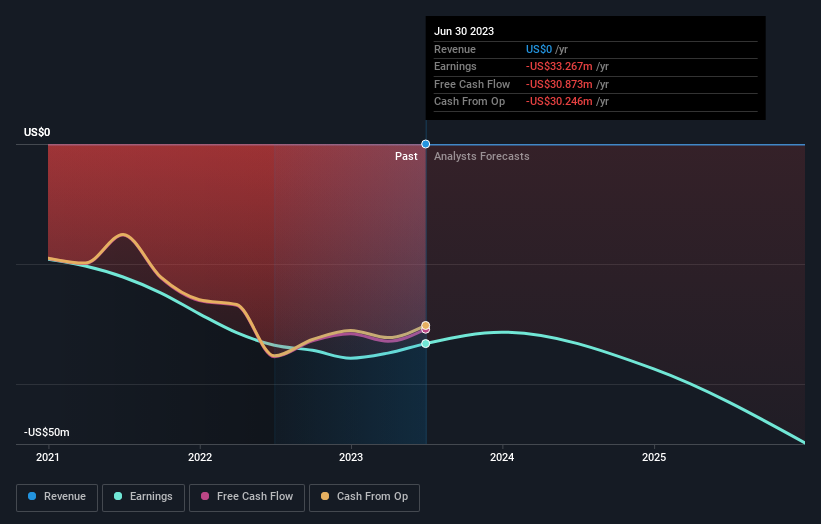Tempest Therapeutics, Inc.'s (NASDAQ:TPST) largest shareholders are private equity firms who were rewarded as market cap surged US$127m last week
Key Insights
Significant control over Tempest Therapeutics by private equity firms implies that the general public has more power to influence management and governance-related decisions
54% of the business is held by the top 5 shareholders
If you want to know who really controls Tempest Therapeutics, Inc. (NASDAQ:TPST), then you'll have to look at the makeup of its share registry. With 32% stake, private equity firms possess the maximum shares in the company. Put another way, the group faces the maximum upside potential (or downside risk).
As a result, private equity firms were the biggest beneficiaries of last week’s 3,587% gain.
In the chart below, we zoom in on the different ownership groups of Tempest Therapeutics.
See our latest analysis for Tempest Therapeutics
What Does The Institutional Ownership Tell Us About Tempest Therapeutics?
Many institutions measure their performance against an index that approximates the local market. So they usually pay more attention to companies that are included in major indices.
Tempest Therapeutics already has institutions on the share registry. Indeed, they own a respectable stake in the company. This can indicate that the company has a certain degree of credibility in the investment community. However, it is best to be wary of relying on the supposed validation that comes with institutional investors. They too, get it wrong sometimes. If multiple institutions change their view on a stock at the same time, you could see the share price drop fast. It's therefore worth looking at Tempest Therapeutics' earnings history below. Of course, the future is what really matters.
Our data indicates that hedge funds own 8.4% of Tempest Therapeutics. That's interesting, because hedge funds can be quite active and activist. Many look for medium term catalysts that will drive the share price higher. Versant Venture Management, LLC is currently the largest shareholder, with 32% of shares outstanding. EcoR1 Capital, LLC is the second largest shareholder owning 8.4% of common stock, and Impresa Management LLC holds about 4.9% of the company stock.
On looking further, we found that 54% of the shares are owned by the top 5 shareholders. In other words, these shareholders have a meaningful say in the decisions of the company.
Researching institutional ownership is a good way to gauge and filter a stock's expected performance. The same can be achieved by studying analyst sentiments. There are a reasonable number of analysts covering the stock, so it might be useful to find out their aggregate view on the future.
Insider Ownership Of Tempest Therapeutics
The definition of an insider can differ slightly between different countries, but members of the board of directors always count. Management ultimately answers to the board. However, it is not uncommon for managers to be executive board members, especially if they are a founder or the CEO.
I generally consider insider ownership to be a good thing. However, on some occasions it makes it more difficult for other shareholders to hold the board accountable for decisions.
Our most recent data indicates that insiders own less than 1% of Tempest Therapeutics, Inc.. It has a market capitalization of just US$130m, and the board has only US$1.2m worth of shares in their own names. We generally like to see a board more invested. However it might be worth checking if those insiders have been buying.
General Public Ownership
The general public, who are usually individual investors, hold a 31% stake in Tempest Therapeutics. While this size of ownership may not be enough to sway a policy decision in their favour, they can still make a collective impact on company policies.
Private Equity Ownership
With an ownership of 32%, private equity firms are in a position to play a role in shaping corporate strategy with a focus on value creation. Sometimes we see private equity stick around for the long term, but generally speaking they have a shorter investment horizon and -- as the name suggests -- don't invest in public companies much. After some time they may look to sell and redeploy capital elsewhere.
Next Steps:
It's always worth thinking about the different groups who own shares in a company. But to understand Tempest Therapeutics better, we need to consider many other factors. Case in point: We've spotted 6 warning signs for Tempest Therapeutics you should be aware of, and 4 of them don't sit too well with us.
If you are like me, you may want to think about whether this company will grow or shrink. Luckily, you can check this free report showing analyst forecasts for its future.
NB: Figures in this article are calculated using data from the last twelve months, which refer to the 12-month period ending on the last date of the month the financial statement is dated. This may not be consistent with full year annual report figures.
Have feedback on this article? Concerned about the content? Get in touch with us directly. Alternatively, email editorial-team (at) simplywallst.com.
This article by Simply Wall St is general in nature. We provide commentary based on historical data and analyst forecasts only using an unbiased methodology and our articles are not intended to be financial advice. It does not constitute a recommendation to buy or sell any stock, and does not take account of your objectives, or your financial situation. We aim to bring you long-term focused analysis driven by fundamental data. Note that our analysis may not factor in the latest price-sensitive company announcements or qualitative material. Simply Wall St has no position in any stocks mentioned.

 Yahoo Finance
Yahoo Finance 

